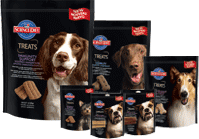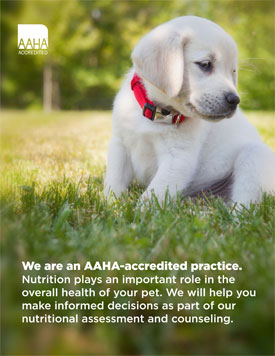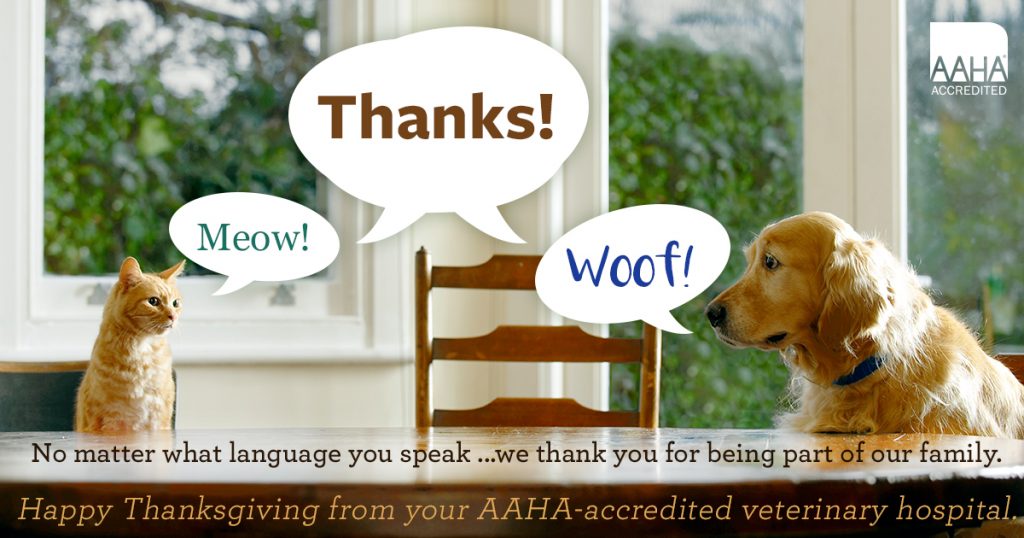Thank you for trusting us with your pet’s nutritional and dietary needs. Our staff will gladly address all your pet food questions and concerns.
Hippocrates said, “Let thy food be thy medicine and thy medicine be thy food.”
Just as in human health, nutrition is one of the most important preventive care tools we can use to prevent or manage disease. Of course, these tools are only helpful when professional recommendations are discussed with and followed by the pet owner.
With so many pet food options out there—and the myths that abound—it can be difficult for clients to know where to start.
We offer a wide variety of specialty and therapeutic diets for all life stages and disease conditions. We also provide special supplements for general wellness and for acute and chronic disease conditions. Making dietary recommendations patient-specific for the lifetime of the pet is consistent with practicing good veterinary medicine. This is an wholistic nutritional management approach also meets and exceeds the pet parents expectations.
If your pet is overweight but you would still like to give him or her a treat without feeling guilty? We have special calorie-reduced treats that you can give to your pet without worry. We also carry treats that help prevent gum disease.
Veterinary consultation is required for our prescription diet foods and our supplements. Call us to schedule an appointment to discuss your pet’s nutritional needs.
ALL OF OUR PET FOODS ARE 100% CUSTOMER AND PET SATISFACTION GUARANTEED
We carry a full line of most commercially available pet foods as well as many specialty diets, chews, treats, etc. If you don’t see it we can probably get it in for you.
How Dog and Cat Foods Are Different
Consider the major points that differentiate dog foods from their feline counterparts:
Palatability
Dogs and cats perceive food differently. For example, among other differences, cats don’t have the ability to taste anything sweet. Their reduced range for what they consider palatable helps explain why dog food doesn’t tend to attract cats as much as cat food does dogs.
Vitamin A
Dogs have the ability to turn beta carotene into Vitamin A, a feat cats’ bodies can’t manage. That’s why Vitamin A must be supplied in cat food. While plenty of dog foods may contain additional vitamin A, they aren’t necessarily formulated to offer the amounts a cat requires for a lifetime of optimum health. A variety of non-specific symptoms and disease states can result when cats don’t receive sufficient levels of Vitamin A in their food.
Taurine
Taurine is considered an essential amino acid for cats. Therefore, all cats require it. Dogs, on the other hand, can make their own taurine, which is why many dog foods are deficient in this nutrient. If a cat is fed a canine diet lacking sufficient levels of taurine, blindness and a heart disease called hypertrophic cardiomyopathy are the most common outcomes.
Note: Taurine deficiency also happens when cats eat a fish-only diet, since fish meat is largely deficient in this amino acid. Which is why you might’ve heard that tuna is “bad” for cats (but isn’t unless you’re not feeding an otherwise balanced diet).
Arachidonic acid
Arachidonic acid is a fatty acid dogs can build themselves. Cats, on the other hand, require the real thing. Cats who eat dog foods low in arachidonic acid levels will suffer a variety of nonspecific symptoms.
Protein
Total protein levels in dog foods tend to be lower than for cat foods. This represents another significant reason not to feed our felines food that’s meant for dogs. Though some dog foods do offer very high levels of protein, most don’t offer the percentage of protein our carnivorous cats require.
In recent years, much has been made of the protein quality and quantity due our cats as part of their normal nutritional requirements. In academic circles, this topic is hotly debated. Let it suffice to say, however, that the protein requirements of obligate carnivores like cats are superior to those of dogs and that cats who consume dog-level protein levels on a regular basis will fail to thrive at rates comparable with their peers.
Questions & Answers
Q: So is it truly terrible to feed your cat the dog stuff if you happen to run out and the shops are all shuttered?
A: Well… no, not really. As long as a) your cat will eat it, b) it’s temporary, and c) your cat is otherwise healthy, dog food is unlikely to harm your cat one bit.
Adapted from PetPlace.com
Our most popular pet nutritional products are from the following companies:
Purina Veterinary Diets for dogs and cats
Hills Prescription Diets & Hills Science Diet
Royal Canin Prescription Diets and regular food




